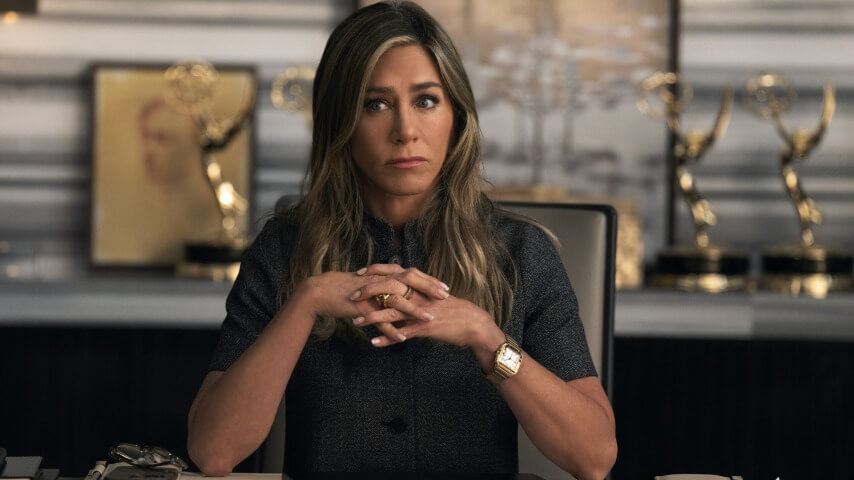In TMS, Stella and UBN’s top anchor, Alex Levy (Jennifer Aniston), shut down that co-worker’s concern immediately, but their private discussion reveals they’re holding on by a thread and fear a potential mutiny from staffers. And as the season rolls out, UBN’s dip into AI spectacularly backfires for everybody (shocker!). Jay Carson’s series has delved into timely topics before, as seen with stories about the #MeToo movement, the COVID-19 pandemic, and the January 6 insurrection. Along the way, TMS unravels a toxic work culture full of dalliances, betrayals, blackmail, cover-ups…you name it. So it’s not surprising that its latest run reflects—in its trademark over-the-top style—the harmful drawbacks of bringing unreliable technology into the newsroom and trying to replace trained talent with it.
Persuaded by board member Celine Dumont (Marion Cotillard), Stella unveils their AI program early to an initially positive response in episode six. But the chatbot—a Stella lookalike, no less—ends up exposing secrets that the real Stella foolishly confided to it, including an ongoing affair with Celine’s husband, Miles (Aaron Pierre). To make matters worse, AI Stella also ridicules the company’s DEI initiatives and makes racist and sexist remarks in front of a large audience. By the end of “If Then,” Celine secures a promotion while Stella resigns and jets off to Italy alone after Miles abandons her. The Morning Show soapily executes this twist, but the plot itself isn’t much of a stretch. AI and journalism’s fusion can lead to the spread of lies and misinformation—just last month, Fox News reported on a string of AI-generated videos about SNAP benefits being cut but presented them as real before rewriting the article. It’s becoming increasingly easy to deceive people and much more difficult to distinguish between what’s fake and genuine. News outlets falling for it or, worse, using this slop themselves instead of calling it out can only cause problems.
In TMS season four, Alex deals with this when the technology she backed becomes a roadblock for her. After she interviews an Iranian fencer, Roya Nazeri (Ava Lalezarzadeh), on live TV in the premiere, she helps Roya and her father leave the building in her car because they expressed a desire to defect. In episode two, a deepfake of hers surfaces that implicates her in plotting their escape, which could land Alex and the corporation in trouble with the FBI. With these arcs, The Morning Show furthers an important conversation about AI’s misuse. Recently, Peacock’s The Paper also noted AI woes (“AI can never replace me,” Chelsea Frei’s compositor/reporter sarcastically claims in the series premiere as she selects stories to aggregate on the homepage), while presenting enthusiasm and passion for actual journalism.
Of course, this has been a hot-button issue in TV shows before. Sci-fi and fantasy dramas like Black Mirror, Westworld, Person Of Interest, and Mrs. Davis wisely positioned AI as the villain or a cautionary tale. Now, the depiction seems more focused on its stressful, seemingly inevitable integration into our daily routines. Look no further than Apple TV’s The Studio, which satirized Hollywood’s interest in AI in episode seven, when director Nicholas Stoller pivoted to it to save time on animation. South Park offered a takedown of ChatGPT after Randy Marsh (Trey Parker) turned to it for marriage counseling advice. And one of the ways to process Vince Gilligan’s Pluribus is to see it as an allegory of how resorting to AI can block critical or creative thinking. (The show’s credits tout that it was made without using “an energy-intensive plagiarism machine.”) As this tech becomes seemingly impossible to ignore in all facets of life, it makes sense that television will probe into it. While The Morning Show isn’t anyone’s go-to series for realism, its warnings on the subject should be taken seriously.

 Keep scrolling for more great stories.
Keep scrolling for more great stories.
